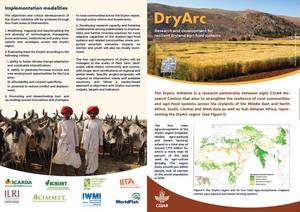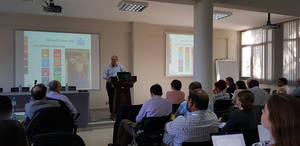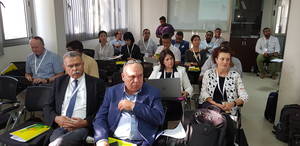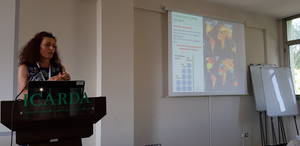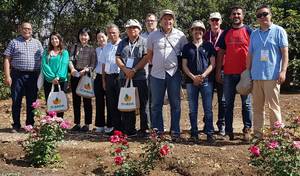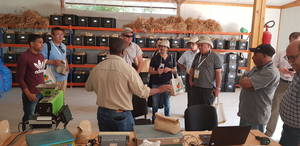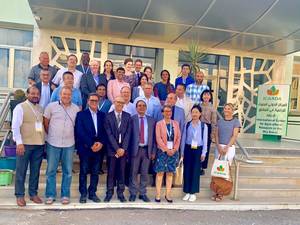DryArc initiative co-design workshop
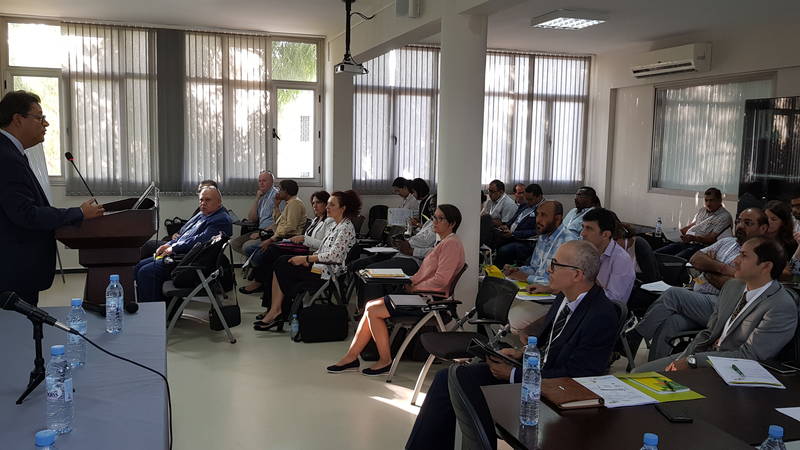
Rabat, Morocco, 8-11 September 2019 – Eight CGIAR* centers participated in a co-design workshop to consolidate
the key objectives of the DryArc Initiative and define its outputs and outcomes while ensuring integration with global climate and resilience needs.
Taking place in ICARDA’s INRA-Morocco hosted offices, the event brought together the National Agricultural Research Systems (NARS), donors, partners, and stakeholders of the DryArc to identify and explore the objectives of the DryArc Initiative, its implementation modalities and Theory of Change.
This cross-CGIAR partnership includes: the International Center for Agricultural Research in the Dry Areas (ICARDA), the International Crops Research Institute for the Semi-Arid Tropics (ICRISAT), the International Institute of Tropical Agriculture (IITA), the International Maize and Wheat Improvement Center (CIMMYT), the WorldFish, the International Food Policy Research Institute (IFPRI), the International Water Management Institute (IWMI), and the International Livestock Research Institute (ILRI).
It is important to highlight that the initiative is aligned with the 2030 Agenda for Sustainable Development, and is based on a system approach.
The four pillars of the DryArc action towards achieving the Sustainable Development Goals (SDGs) are:
- combining knowledge (local, regional, international) to design systemic innovations,
- accelerating scaling up of impactful target innovations,
- continuous integration of disruptive technologies,
- and enabling institutional environment (decision-making, M&E, absorptive capacity, investment).
The dryland region is considered the most vulnerable to climate variability and change. Along with the rapid population growth, the communities of the drylands are increasingly exposed to the risk of livelihoods shocks and losses. Several of these communities are further plagued by conflicts, social unrest, and protracted crises.
In order to provide a response to these multiples challenges, the eight CGIAR centers have joined forces with the National Agricultural Research Systems (NARS), and other key development stakeholders, such as FAO and the Chinese Academy of Agricultural Sciences (CAAS), to discuss and co-draft this new initiative, which is specifically designed to drive market-led innovations for sustainable agricultural intensification of the drylands, contributing to sustained ecosystem services and reduced water scarcity, and adaptation to climate change (heat, drought, floods, glacier loss).
On the last day of the workshop, the policy advice component for countries to adapt was emphasized. A field trip was organised for the donor representatives.
See also:
Press Release FAO 25/09/2019. The DryArc Initiative: a CGIAR Research Center partnership aiming to strengthen the resilience of rural communities and agri-food systems across the Global Drylands
Video interviews about the new CGIAR DryArc Initiative:
Opportunities of the DryArc Initiative
Interview with Dr. Michel Afram - Director General Lebanese Agricultural Research Institute (LARI) and member of the ICARDA Board of Trustees. He answers following questions:
- How can the DryArc Initiative benefit from the rich Lebanese culinary tradition?
- Does the processing of traditional food require new technologies and skills?
- Can the DryArc Initiative promote specific food niches?
- Can those niches be made more attractive for export to the European Union?
- What is the most urgent research priority for the DryArc Initiative?
- Which international expertise would be needed for this?
- Can a consortium of international agricultural research centers influence national policy makers?
- Can LARI play a role in the food safety problems of countries in the South?
- Can South-South collaboration be fruitful under the DryArc initiative?
- Is triangular cooperation the future?
Les enjeux de l’initiative DryArc
Interview with Dr. Pascal Bergeret - Directeur de l'Institut Agronomique Méditerranéen de Montpellier (CIHEAM-IAMM)
He answers following questions:
- 1. Est-ce que des formations pour des jeunes agri-entrepreneurs sont cruciales?
- 2. Quelles sont les niches porteuses?
- 3. Les pays de l'Union Européenne sont-ils interessés par les produits de terroire de l'Afrique du Nord?
- 4. Est-ce que ces produits recoivent un intéret dans les bourses alimentaires en Europe?
- 5. Est-ce qu'une collaboration triangulaire (Nord-Sud-Sud) est le mode d'opération de DryArc?
- 6. Il y-a-t-il un rôle particulier pour la recherche chinoise?
- 7. Quelle est l'importance des banques de semences pour le projet DryArc?
- 8. Quelles sont les prioritées de recherche pour les cultures orphélines?
- 9. Quelle est l'importance des standards phyto-sanitaires pour la zone africaine de libre échange?
- 10. Le DryArc doiot-il jouer un rôle dans la stimulation du commerce régional?
- 11. Quelle est votre appréciation du programme de financement de la recherche: PRIMA?
- 12. Vous partagez le sentiment d'urgence de DryArc?
Research challenges for the dry and marginal environments
Interview with Ms Seta Tutundjian Director of Programs International Center for Biosaline Agriculture. ICBA is a founding member of the Association of International Research and Development Centers for Agriculture (AIRCA). Established in March 2012.- What are the research challenges for the dry and marginal environments?
- How can we trigger the demand for research products?
- What are technologies which can be easily upscaled?
- What are the research demands from the private sector?
- Can the DryArc research initiative contribute to technichal food processing research needs?
- How can the DryArc research initiative contribute to the food transition debate?
- How can donors reconcile the urgent research needs with long term research funding?
- How important is the South-South collaboration in the DryArc research initiative?
The DryArc research initiative's impact on jobs and consumers' demand
Interview with Dr. Kumar Shalandar, Principal Scientist, Innovation Systems for the Drylands, ICRISAT
- Why is the DryArc research initiative so important?
- What are the unique opportunities of crop cultivation in dry areas?
- Can an increased demand for dryland crops also create new jobs?
- Can the DryArc research initiative influence consumer demand?
The importance for the FAO to collaborate with research organisations in arid zones
Interview with Dr. Rachid Serraj, Senior Agricultural Officer, Regional Office for North Africa and the Near East FAO ; Delivery Manager Regional Initiative for the Small Scale Farmers.
He answered following questions:
- Why is it important for the FAO to collaborate with research for development organisations in the arid zones?
- What about the nutritional dependency in the arid zones on a limited number of cereals?
- How can policy be influenced when the production of one cereal is over-emphasised at the expense of legumes?
- How can policy be influenced when the production of one cereal is over-emphasised at the expense of legumes?
- How important is South-South collaboration or Triangular collaboration for agricultural research in the arid areas?
- Is such collaboration among CGIAR centers and South-South something what donor expect currently?
- How should research link-up with the agro-ecology agenda?
- Would orphan crops be a research priority under the agro-ecology framework?
- How urgent are the problems identified under the DryArc prgramme to be tackled seriously?
The collaboration of the Kingdom of Saudi Arabia with ICARDA
Interview with Dr. Naser B. Almarri General Director Seed Center Secretary-General of the National Committee for the Management of Plant Genetic Resources Ministry of Environment, Water and Agriculture Kingdom of Saudi Arabia-Riyadh.
Additional video interviews:
Below are video-messages from representatives that couldn’t attend the event.
Interview with Dr. Martin Kropff, Director General of CIMMYT.
Supporting agricultural innovation in dry areas
- What are the challenges of agriculture in dry areas
- Why should donors support the DryArc initiative?
IITA et la nouvelle Initiative DryArc
- Quelle est la relation entre le programme "Technologies for African Agricultural Transformation" (TAAT)
- et la nouvelle initiative DryArc?
- Quelles technologies du TAAT peuvent être utiles pour la région du DryArc?
- Les technologies de transformation dans la région du DryArc peuvent-elles être utiles pour l'Afrique sub-saharienne?
South-South collaboration North Africa-SSA
- How can African countries benefit from the annual Food Manufacturing Exhibitions in Cairo?
- What is the expertise of the Egyptian Desert Research Center?
"The expertise of the Egyptian Desert Research Center can be scale-up through South-South Cooperation (SSC), the desert research center has over 20 experimental station covering all the desert zones in Egypt (…) this research center has the expertise and the experts that would help providing SSC, because we are facing similar problems, scarcity of water, desertification, innovation regarding how to make use of whatever resources that we have in the desert.” - How important is the upscaling of raised-bed technologies to produce faba beans and wheat in Egypt?
- How important is the collaboration among the CGIAR centers at the level of your country?
Interview with Prof. Martin Van Ittersum, Professor Plant Production Systems, WaCASA, Wageningen University
Maize productivity must increase four-fold to meet growing demand in Africa.
- How urgent is the need for an increased maize production in Africa?
- Is this a trade-off between higher production and higher CO2 emissions?
- Can the current modelling systems allow for seasonal forecasting?
- Would it be possible to foresee good years from bad years?
Interview with Dr. Stefan SCHMITZ, Deputy Director-General, Department of Food, Rural Development and Natural Resources, Federal Ministry for Economic Cooperation and Development (BMZ)
New challenges for the dry arid areas
- What are the specific challenges of dry arid areas?
- What is breeding for better seeds so important?
- Why is trade important for agricultural development?
- What about cross-border trade?
- Do you encourage a greater collaboration among CGIAR centers?

